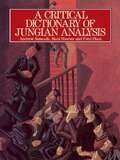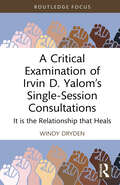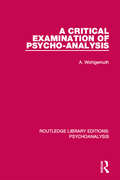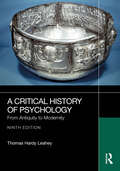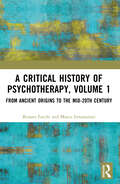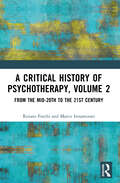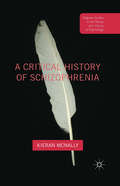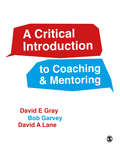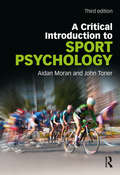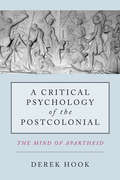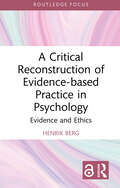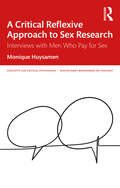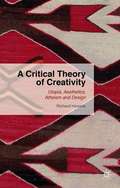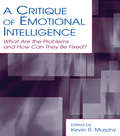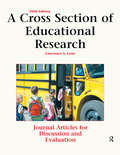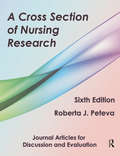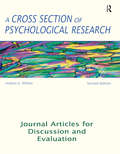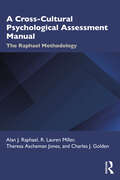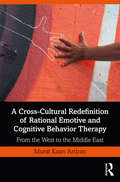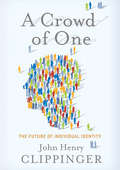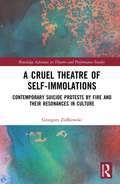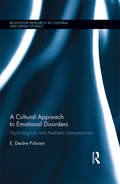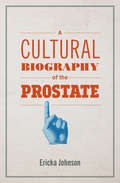- Table View
- List View
A Critical Dictionary of Jungian Analysis
by Andrew Samuels Bani Shorter Fred PlautThe language of Jung's writings, and of analytical psychology generally, is sometimes difficult to understand. This guide, in dictionary format, combines scholarship and historical accuracy with a stimulating, critical attitude.
A Critical Examination of Irvin D. Yalom’s Single-Session Consultations: It is the Relationship that Heals (Routledge Focus on Mental Health)
by Windy DrydenThis book explores the single-session work done by Irving Yalom and considers the implications of this work for the current theory and practice of single-session therapy (SST).Due to failing memory and decreasing stamina as he aged, Yalom eventually decided that if he was to continue to offer help to patients, he could only do so by offering them single-session consultations. While it was perhaps reluctant single-session work, it coincided with the continued rise of SST starting with the publication of Moshe Talmon's book in 1990. This book examines Yalom’s work against the growing literature on single-session therapy, covering both what single-session therapists can learn from Yalom’s consultations as well as what they would not want to implement. Dryden closely examines Yalom’s work in these sessions through a single-session mindset and tracks how it impacts the development of SST.This book will be of interest to any single-session practitioners as well as those scholars and followers of Yalom.
A Critical Examination of Psycho-Analysis (Routledge Library Editions: Psychoanalysis)
by A. WohlgemuthOriginally published in 1923, this title is a critical examination of Freud’s theory of psychoanalysis. A contemporary of Freud, the author sets out to evaluate his theories in a scientific manner, searching for evidence. The result is a rather scathing review of where this is lacking.
A Critical History and Philosophy of Psychology
by Richard T. G. Walsh Thomas Teo Angelina Baydala Richard T. G. Walsh Thomas TeoIn line with the British Psychological Society's recent recommendations for teaching the history of psychology, this comprehensive undergraduate textbook emphasizes the philosophical, cultural and social elements that influenced psychology's development. The authors demonstrate that psychology is both a human (i. e. psychoanalytic or phenomenological) and natural (i. e. cognitive) science, exploring broad social-historical and philosophical themes such as the role of diverse cultures and women in psychology, and the complex relationship between objectivity and subjectivity in the development of psychological knowledge. The result is a fresh and balanced perspective on what has traditionally been viewed as the collected achievements of a few 'great men'. With a variety of learning features, including case studies, study questions, thought experiments and a glossary, this new textbook encourages students to critically engage with chapter material and analyze themes and topics within a social, historical and philosophical framework.
A Critical History of Psychology: From Antiquity to Modernity
by Thomas Hardy LeaheyThis fully updated and refreshed 9th edition places social, economic and political forces of change alongside psychology’s internal theoretical and empirical arguments. It utilizes a critical lens to illuminate the way in which the external world has shaped the development of psychology and, in turn, how psychology from antiquity to modernity has shaped society.The text approaches the material from an integrative, rather than wholly linear, perspective, carefully examining how issues in psychology reflect and affect concepts that lie outside the field of psychology’s technical concerns as a science and profession.Key features of this edition include: A newly reconsidered structure, including five additional interludes exploring historical background narratives and the rise of modernity, to allow for flexible and adaptable textbook use. Expanded exploration of the two psychologies: the Way of Ideas, driven by epistemology and unique to Europe, and The Way of Human Nature, a universal concern to find a science of human behavior and its management. Including scientific, applied, and professional psychology, as well as coverage of the social sciences and social policy implications, this book is appropriate for high-level undergraduate and graduate students.
A Critical History of Psychotherapy, Volume 1: From Ancient Origins to the Mid 20th Century
by Renato Foschi Marco InnamoratiThis unique book offers a comprehensive overview of the history of psychotherapy. The first of two volumes, it traces the roots of psychotherapy in ancient times, through the influence of Freud and Jung up to the events following World War II. The book shows how the history of psychotherapy has evolved over time through different branches and examines the offshoots as they develop. Each part of the book represents a significant period of time or a decade of the 20th century and provides a detailed overview of all significant movements within the history of psychology. The book also shows connections with history and contextualizes each therapeutic paradigm so it can be better understood in a broader social context. The book is the first of its kind to show the parallel evolution of different theories in psychotherapy. It will be essential reading for researchers and students in the fields of clinical psychology, psychotherapy, psychiatry, the history of medicine and psychology.
A Critical History of Psychotherapy, Volume 2: From the Mid-20th to the 21st Century
by Renato Foschi Marco InnamoratiThis unique book offers a comprehensive overview of the history of psychotherapy. Volume 2 traces the evolution of psychotherapy from the 1950s and the later 20th century through to modern times, considering what the future of psychotherapy will look like. The book shows how the history of psychotherapy has evolved over time through different branches and examines the offshoots as they develop. Each part of the book represents a significant period of time or a decade of the 20th century and provides a detailed overview of all significant movements within the history of psychology. The book also shows connections with history and contextualizes each therapeutic paradigm so it can be better understood it in a broader social context. The book is the first of its kind to show the parallel evolution of different theories in psychotherapy. It will be essential reading for researchers and students in the fields of clinical psychology, psychotherapy, psychiatry, the history of medicine and psychology.
A Critical History of Schizophrenia (Palgrave Studies in the Theory and History of Psychology)
by Kieran McNallySchizophrenia was 20th century psychiatry's arch concept of madness. Yet for most of that century it was both problematic and contentious. This history explores schizophrenia's historic instability via themes such as symptoms, definition, classification and anti-psychiatry. In doing so, it opens up new ways of understanding 20th century madness.
A Critical Introduction to Coaching and Mentoring: Debates, Dialogues and Discourses
by David A Lane Professor Robert Garvey David E GrayThis is the definitive introduction to coaching and mentoring, written by an experienced and multidisciplinary team. Taking you all the way through from the emerging theory to informed practice, the book covers: · Skills, purposes and outcomes of coaching and mentoring processes · The many settings in which they take place – public, private and voluntary · Coaching and mentoring’s evidence base and how it is assessed · The professionalization of coaching and mentoring and a move towards integration. Supported by a wide range of case studies, activities, further questions and topics for discussion, this book is a comprehensive but accessible introduction. The authors take a critical approach and go beyond the basics, to support your development as a critically reflective practitioner. It is essential reading for those studying coaching and mentoring, and professionals looking to integrate coaching and mentoring into their organizations.
A Critical Introduction to Coaching and Mentoring: Debates, Dialogues and Discourses
by David A Lane David E Gray Robert GarveyThis is the definitive introduction to coaching and mentoring, written by an experienced and multidisciplinary team. Taking you all the way through from the emerging theory to informed practice, the book covers: · Skills, purposes and outcomes of coaching and mentoring processes · The many settings in which they take place – public, private and voluntary · Coaching and mentoring’s evidence base and how it is assessed · The professionalization of coaching and mentoring and a move towards integration. Supported by a wide range of case studies, activities, further questions and topics for discussion, this book is a comprehensive but accessible introduction. The authors take a critical approach and go beyond the basics, to support your development as a critically reflective practitioner. It is essential reading for those studying coaching and mentoring, and professionals looking to integrate coaching and mentoring into their organizations.
A Critical Introduction to Sport Psychology: A Critical Introduction
by Aidan Moran John TonerThe new third edition of A Critical Introduction to Sport Psychology is the only textbook in the field that provides a detailed overview of key theories, concepts and findings within the discipline of sport psychology, as well as a critical perspective that examines and challenges these core foundations. Fully revised and updated, the new edition covers key research findings affecting both participation and performance in sport, including topics such as motivation, anxiety, emotional coping, concentration, mental imagery, expertise and team cohesion. In addition, the book includes a range of helpful features that bring the science to life, including critical thinking exercises, suggestions for student projects and new "In the spotlight" boxes that highlight key advances in theory or practice. A comprehensive glossary is also included, whilst a final chapter examines some new horizons in sport psychology, including embodied cognition and socio-cultural perspectives. Sport is played with the body but often won in the mind; that is the theory. A Critical Introduction to Sport Psychology is the definitive textbook for anyone wishing to engage critically with this fascinating idea.
A Critical Psychology of the Postcolonial: The Mind of Apartheid
by Derek HookAn oft-neglected element of postcolonial thought is the explicitly psychological dimension of many of its foundational texts. This unprecedented volume explores the relation between these two disciplines by treating the work of a variety of anti-colonial authors as serious psychological contributions to the theorization of racism and oppression. This approach demonstrates the pertinence of postcolonial thought for critical social psychology and opens up novel perspectives on a variety of key topics in social psychology. These include: the psychology of embodiment and racialization resistance strategies to oppression 'extra-discursive’ facets of racism the unconscious dimension of stereotypes the intersection of psychological and symbolic modalities of power. In addition, the book makes a distinctive contribution to the field of postcolonial studies by virtue of its eclectic combination of authors drawn from anti-apartheid, psychoanalytic and critical social theory traditions, including Homi Bhabha, Steve Biko, J.M. Coetzee, Frantz Fanon, Julia Kristeva, Chabani Manganyi and Slavoj Żiżek. The South African focus serves to emphasize the ongoing historical importance of the anti-apartheid struggle for today’s globalized world. A Critical Psychology of the Postcolonial is an invaluable text for social psychology and sociology students enrolled in courses on racism or cultural studies. It will also appeal to postgraduates, academics and anyone interested in psychoanalysis in relation to societal and political issues.
A Critical Reconstruction of Evidence-based Practice in Psychology: Evidence and Ethics (Routledge Focus on Mental Health)
by Henrik BergEvidence-based practice in psychology is the dominant regulatory principle in clinical psychology, defining psychological knowledge and its application. This book provides a critical analysis and a reconstruction of the policy statement focusing on epistemology and ethics.The book shows the ideological and historical background for the development of evidence-based practice in psychology. It covers the main conceptual and empirical arguments leading to this transition including philosophy and evidence-based medicine. The book goes on to show some of the defects of evidence-based practice in psychology: it misconstrues psychological knowledge; reduces the number of ethical resources available to regulate psychological practices; does not fulfil its ambitions of being a tripartite concept; and undertheorises the issue of integration. The closing chapters provide a constructive critique, preserving the valuable aspects of evidence-based practice in psychology while developing it to make it function adequately. In that sense, the book aims to change the way psychological knowledge is understood and used in practice.This text will be engaging and thought-provoking for anyone using psychological knowledge with patients or clients. It will provide analytic resources to understand psychology better and facilitate the application of psychological knowledge in various settings.
A Critical Reflexive Approach to Sex Research: Interviews with Men Who Pay for Sex (Concepts for Critical Psychology)
by Monique HuysamenA Critical Reflexive Approach to Sex Research is a methodologically focused book that offers rich insights into the, often secret, subjectivities of men who pay for sex in South Africa. The book centres on the interview context, outlining a critical reflexive approach to understanding how knowledge is co-produced by both the interviewer and the participant in research about sex. By attending to the complex dynamics of the research interview, this book examines the historic and contemporary relationship between sex work, race, coloniality, sexuality, masculinity, femininity, whorephobia, and discourses of disease and contagion. It draws on both empirical interview data and Huysamen’s entries in her research journal to offer a unique approach to building critical reflexivity into every phase of the research process. The critical reflexive approach uses an assemblage of poststructuralist and psychoanalytic theories and practices which together provide tools to interrogate how interview dynamics facilitate, shape, and restrain the meaning that is produced within the interview. This book will be a valuable resource for anyone interested in researching sex work from intersectional and feminist decolonial perspectives as it probes critical questions surrounding how men make meaning of paying for sex, their motivations for doing so, and how they negotiate their identities in relation to this stigmatised practice. It provides a unique offering to researchers working on sexual, secret, and stigmatised topics, providing them with a specific set of tools and resources to incorporate reflexivity into their own sex research. Encouraging the reader to look widely to draw on an array of theories and frameworks across disciplines, this is fascinating reading for students and researchers in critical psychology, research methods, and the social sciences.
A Critical Theory of Creativity
by Richard HowellsA Critical Theory of Creativity argues that a Utopian drive is aesthetically encoded within the language of form. Combining multidisciplinary theory with case studies ranging from planned communities to the relationship between Navajo theology and design, this book demonstrates how humankind is striving to fashion a better world from the raw materials we inherit. Building upon the work of Ernst Bloch, Howells sees the 'fall' as a liberation and Prometheus as a hero. He takesreligion seriously as a cultural narrative, but replaces divine creation with human creativity. Coupled with this liberation from Eden comes a very human obligation that cannot be delegated to God, to nature or to market forces. A Critical Theory of Creativity's intellectual compass ranges from Roger Fry to Philip Pullman and Slavoj Žižek, returning always to an empowering, human-centred universe. As Bloch declared in The Spirit of Utopia, 'Life has been put into our hands. '
A Critique of Emotional Intelligence: What Are the Problems and How Can They Be Fixed? (Applied Psychology Series)
by Kevin R. MurphyThis book analyzes important criticisms of the current research on Emotional Intelligence (EI), a topic of growing interest in the behavioral and social sciences. It looks at emotional intelligence research and EI interventions from a scientific and measurement perspective and identifies ways of improving the often shaky foundations of our current conceptions of emotional intelligence. With a balanced viewpoint, A Critique of Emotional Intelligence includes contributions from leading critics of EI research and practice (e.g., Frank Landy, Mark Schmit, Chockalingam Viswesvaran), proponents of EI (e.g., Neal Ashkanasy, Catherine Daus), as well as a broad range of well-informed authors. Proponents claim that EI is more important in life than academic intelligence, while opponents claim that there is no such thing as emotional intelligence. Three key criticisms that have been leveled at emotional intelligence include: (1) EI is poorly defined and poorly measured; (2) EI is a new name for familiar constructs that have been studied for decades; and (3) claims about EI are overblown. While the book presents these criticisms, the final section proposes ways of improving EI research and practice with EI theories, tests, and applications.
A Cross Section of Educational Research: Journal Articles for Discussion and Evaluation
by Lawrence S Lyne• This collection of research articles emphasizes topics of interest to classroom teachers. • The 38 research articles illustrate: •survey research •quantitative content analysis •correlational research •true experimental research •quasi-experimental research •pre-experimental research •single-subject research/behavior analysis •causal-comparative research •program evaluation •qualitative research •combined qualitative/quantitative research •meta-analysis • The lines in each article are numbered sequentially, making it easy to refer to specific parts of the article during classroom discussions. • The availability of a single source of research articles is convenient and helps you avoid copyright infringement problems. • Factual Questions at the end of each article allow students to check their comprehension. • Questions for discussion stimulate classroom discussions of research methods. • After answering the questions, students rate the quality of each article using 13 basic criteria. More detailed criteria in the Appendix may also be applied. • Ideal for courses in which the primary goal is to learn how to evaluate research. • Twenty-one different journals are represented in the 38 articles in this collection. Students see the diversity of educational research since the journals vary in their standards for publication. • New to this edition: Thirteen new articles keep this popular research reader up-to-date.
A Cross Section of Nursing Research: Journal Articles for Discussion and Evaluation
by Roberta J Peteva• The 39 research articles in this collection illustrate a wide variety of models for both quantitative and qualitative nursing research. •The lines in each article are sequentially numbered, which facilitates classroom discussions by allowing professors and students to pinpoint specific parts of an article. •The articles have been carefully selected for use with students who are just beginning their study of research methods. The difficulty level will challenge but not overwhelm. •Factual Questions at the end of each article draw students’ attention to methodologically important points. •Questions for Discussion request students’ opinions on unique aspects of each article. •Helps instructors avoid copyright infringement problems. The publisher has paid fees to the copyright holders for permission to include the research articles in this book. • New to this edition: A copy of our Bonus Articles for A Cross Section of Nursing Research booklet is included free of charge. •The research articles are classified under these major headings: •nonexperimental quantitative research•true experimental research•quasi-experimental research•pre-experimental research•qualitative research•combined qualitative and quantitative research•test reliability and validity research•meta analysis.The articles have been drawn from a wide variety of journals such as: •Behavior Modification•Cancer Nursing•Computers in Nursing•Computers, Informatics, Nursing•Health Education & Behavior•Issues in Mental Health Nursing•Journal for Nurses in Staff Development•Journal of Community Health Nursing•Journal of Gerontological Nursing•Journal of Nursing Care Quality•Journal of Pediatric Nursing•Journal of Research in Nursing•Journal of the Society of Pediatric Nurses•Nurse Educator•Nursing Research•Psychological Reports•Public Health Nursing•Rehabilitation Nursing•Research in Nursing & Health•The Journal of Nursing Administration•Western Journal of Nursing Research
A Cross Section of Psychological Research: Journal Articles for Discussion and Evaluation
by Andrea K MilinkiFirst Published in 2006. This book is designed for students who are learning how to evaluate published psychological research. The 41 research articles in this collection provide the stimulus material for such a course.
A Cross-Cultural Psychological Assessment Manual: The Raphael Methodology
by Charles J. Golden Alan J. Raphael R. Lauren Miller Theresa Ascheman JonesThis user-friendly manual provides a cross-cultural psychological assessment battery, including projective methods. Authors outline a new, empirically validated, reliable system, which seeks to update the scoreable and interpretable factors and entwine commonly respected “tried and true” graphomotor tests, thereby maximizing their efficacy in the assessment of significant psychological traits in children and adults. Because of its use as a gender fair, culture free, language free testing method, it will be a valuable asset in all areas of current psychological assessment. The CCPAB test takes approximately 20 to 40 minutes to administer, and does not require any administration materials that most practitioners would not have readily available. The CCPAB can be used by evaluators on its own or in conjunction with other psychological and neuropsychological test data, as well as by mental health treatment providers seeking a quick and accurate way to assess the psychological functioning of individuals aged six years and older. Multiple appendices contain information on scoring criteria, scoring keys, and a wealth of sample questions which will also be a useful resource for evaluators. This manual is appropriate for users ranging from graduate-level students in training and supervision to even the most skilled assessment psychologists for quick and valid assessment of a wide range of clients.
A Cross-Cultural Redefinition of Rational Emotive and Cognitive Behavior Therapy: From the West to the Middle East
by Murat ArtiranThis unique volume integrates history, mythology/folklore, and theory and research to bridge the gap between Western and Middle Eastern approaches to and understanding of psychotherapy, particularly Cognitive Behavior Therapy (CBT) and Rational Emotive Behavior Therapy (REBT). Part I lays the foundation with an overview of the theoretical essentials of REBT and CBT in the West, the goals and assumptions of REBT and CBT in the Middle East, and what Middle Eastern clients understand about cognitive distortions, irrational beliefs, and emotions. In Part II, chapters delve more deeply into how psychology is placed in the context of Middle Eastern folklore. The author provides a summary of the history of psychology in the Middle East; an analysis of the relevance of Sufism to self-acceptance, acceptance of others, and life acceptance; and an evaluation of the use of metaphor in psychotherapy from the Middle Eastern perspective. Finally, the author provides case studies that show how these concepts are applied in practice. This text is ideal reading for researchers and clinicians who study Middle Eastern psychology and who work with Middle Eastern clients, as well as for Middle Eastern psychologists and clients.
A Crowd of One: The Future of Inidvidual Identity
by John HenryGreat leaps forward in scientific understanding have, throughout history, engendered similar leaps forward in how we understand ourselves. Now, the new hybrid disciplines of evolutionary biology and social physics are making the next leap possible-and fundamentally altering our notions of individual identity. If identity is a fact not derived from within the individual, but conferred on an individual by a group, or network, a host of assumptions about how governments work, how conflicts arise and are resolved, and how societies can be coaxed toward good are overturned. John Clippinger brilliantly illuminates how the Enlightenment itself-the high point of individual assertiveness-was a product not just of a few moments of individual inspiration and creativity, but rather of a societal shift that allowed innovation and creativity to flourish. Michelangelo owes quite as much to the circumstances of the Renaissance as the Renaissance does to the work of Michelangelo. Now, the digitalization of society, which affects all of us already, allows new insight into these questions: What does it require for societies, organizations and individuals, to thrive? Who decides who you are? How can happiness be shared and spread? Who can you trust?
A Cruel Theatre of Self-Immolations: Contemporary Suicide Protests by Fire and Their Resonances in Culture (Routledge Advances in Theatre & Performance Studies)
by Grzegorz ZiółkowskiA Cruel Theatre of Self-Immolations investigates contemporary protest self-burnings and their echoes across culture. The book provides a conceptual frame for the phenomenon and an annotated, comprehensive timeline of suicide protests by fire, supplemented with notes on artworks inspired by or devoted to individual cases. The core of the publication consists of six case studies of these ultimate acts, augmented with analyses and interpretations hailing from the visual arts, film, theatre, architecture, and literature. By examining responses to these events within an interdisciplinary frame, Ziółkowski highlights the phenomenon’s global reach and creates a broad, yet in-depth, exploration of the problems that most often prompt these self-burnings, such as religious discrimination and harassment, war and its horrors, the brutality and indoctrination of authoritarian regimes and the apathy they produce, as well as the exploitation of the so-called "subalterns" and their exclusion from mainstream economic systems. Of interest to scholars from an array of fields, from theatre and performance, to visual art, to religion and politics, A Cruel Theatre of Self-Immolations offers a unique look at voluntary, demonstrative, and radical performances of shock and subversion.
A Cultural Approach to Emotional Disorders: Psychological and Aesthetic Interpretations (Routledge Research in Cultural and Media Studies)
by E. Deidre PribramIn her latest contribution to the growing field of emotion studies, Deidre Pribram makes a compelling argument for why culturalist approaches to the study of emotional "disorders" continue to be eschewed, even as the sociocultural and historical study of mental illness flourishes. The author ties this phenomenon to a tension between two fundamentally different approaches to emotion: an individualist approach, which regards emotions as the property of the individual, whether biologically or psychologically, and a culturalist approach, which regards emotions as collective, social processes with distinctive histories and meanings that work to produce particularized subjects. While she links a strong preference for the individualist construct in Western culture to the rise of the psychological and psychiatric disciplines at the turn of the twentieth century, Pribram also engages with a diverse set of case studies tied to psychological and aesthetic discourses on emotions. These range from Van Gogh’s status as emotionally disordered to the public, emotional aesthetics of 19th century melodrama to the diagnostic categories of the DSMs and the fear of "globalizing" emotional disorders in the 21st century. This genuinely interdisciplinary approach makes for a text with potential application in a wide range of disciplines within cultural studies, including sociocultural and historical analysis of psychiatry and psychology, gender theory, subject and identity theory, popular culture studies, and history and theory of the arts.
A Cultural Biography of the Prostate
by Ericka JohnsonWhat contemporary prostate angst tells us about how we understand masculinity, aging, and sexuality.We are all suffering an acute case of prostate angst. Men worry about their own prostates and those of others close to them; women worry about the prostates of the men they love. The prostate--a gland located directly under the bladder--lurks on the periphery of many men's health issues, but as an object of anxiety it goes beyond the medical, affecting how we understand masculinity, aging, and sexuality. In A Cultural Biography of the Prostate, Ericka Johnson investigates what we think the prostate is and what we use the prostate to think about, examining it in historical, cultural, social, and medical contexts. Johnson shows that our ways of talking about, writing about, imagining, and imaging the prostate are a mess of entangled relationships. She describes current biomedical approaches, reports on the "discovery" of the prostate in the sixteenth century and its later appearance as both medical object and discursive trope, and explores present-day diagnostic practices for benign prostate hyperplasia--which transform a process (urination) into a thing (the prostate). Turning to the most anxiety-provoking prostate worry, prostate cancer, Johnson discusses PSA screening and the vulnerabilities it awakens (or sometimes silences) and then considers the presence of the absent prostate--how the prostate continues to affect lives after it has been removed in the name of health.
